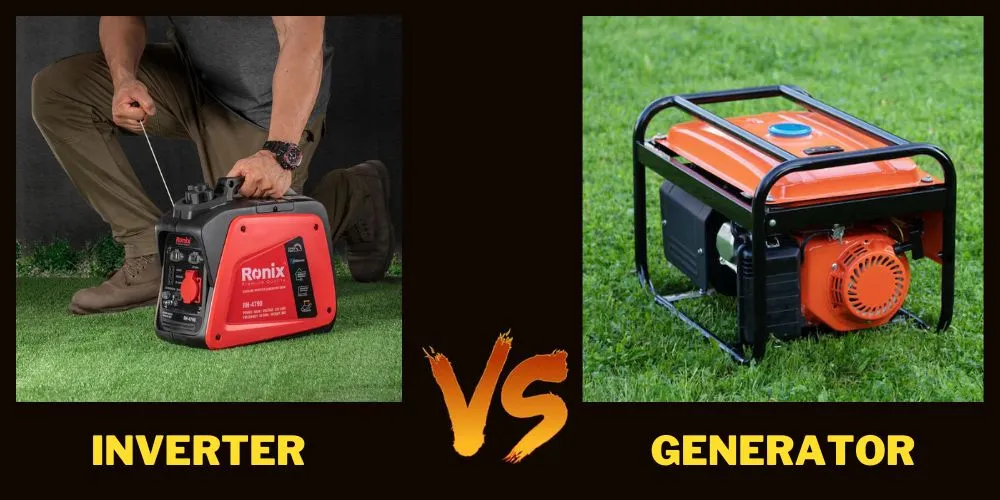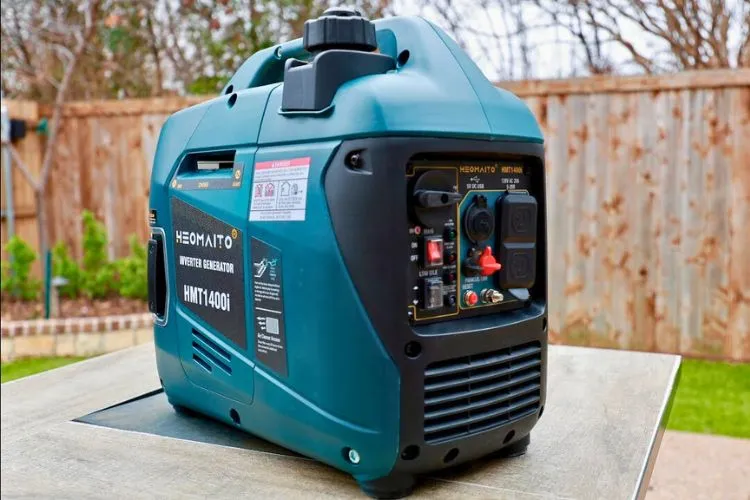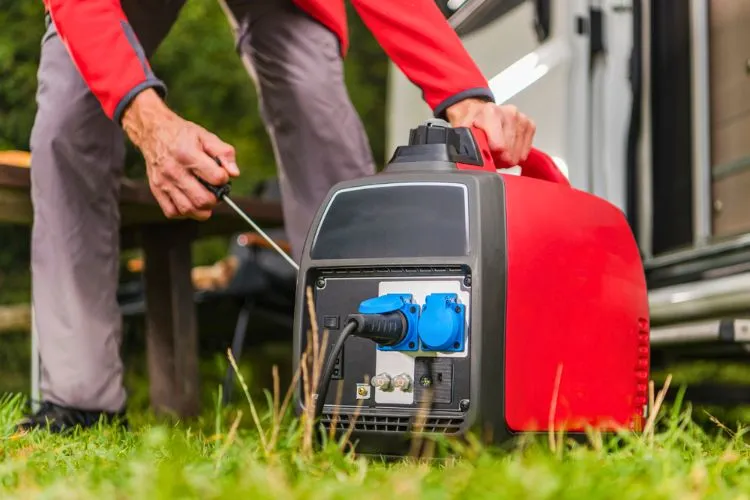Determining the right power source is critical, whether you need energy for a backyard event or a construction site.
The choice often narrows down to inverter generators and traditional generators.
While both serve the same function—providing power—their operation, efficiency, and suitability vary significantly.
This detailed inverter vs generator comparison aims to help you make an informed decision.

What is an Inverter Generator?
An inverter generator is designed to produce more stable and clean power comparable to the electricity you receive from utility companies.

By converting AC (Alternating Current) into DC (Direct Current), and then back to AC, inverter generators provide a consistent current which is crucial for powering sensitive electronics like laptops, smartphones, and cameras.
Pros and cons of Inverter Generators
Pros
✅ Stable Power: Ideal for devices sensitive to power fluctuations.
✅ Quiet Operation: They operate more quietly compared to traditional generators.
✅ Fuel Efficiency: Adjusts the engine speed to the load demand, saving fuel.
Cons
❌ Higher Cost: They are generally more expensive.
❌ Limited Power Output: Usually less power output compared to traditional models.
What is a Traditional Generator?
Traditional generators have been around for a long time, providing a straightforward method to generate electricity.
They run on a fuel engine that drives an alternator to produce power. This type of generator is ideal for high-power requirements.

Pros and cons of Traditional Generator?
Pros
✅ Power Output: Capable of producing a lot of power, usually above 10,000 watts.
✅ Cost-Effective: Less expensive than inverter generators.
Cons
❌ Noise: Can be quite loud during operation.
❌ Heavy Fuel Consumption: Generally less efficient with fuel.
❌ Power Fluctuation: Not suitable for sensitive electronic equipment as they can produce fluctuating power.
Inverter vs Generator: A Detailed Comparison
- Performance: When it comes to power output, traditional generators lead due to their capability to generate more power. However, for efficient operation, particularly under varying loads, the inverter generator is superior due to its ability to adapt the engine speed based on demand.
- Portability: Inverter generators are typically lighter and smaller, making them easy to move and store, an ideal feature for camping or tailgating.
- Noise Level: Inverter generators are much quieter compared to traditional generators, making them a better option for domestic use in neighborhoods or camping.
- Environmental Impact: With a more efficient engine, inverter generators produce fewer emissions. This feature makes them a preferable choice for those conscious of their environmental impact.
- Cost: Traditional generators win in the initial price battle; they are cheaper than inverters. However, the operational cost of inverter generators could be lower due to their fuel efficiency.
- Maintenance: Both types need regular maintenance, but the simpler mechanism of traditional generators makes them slightly easier and cheaper to maintain.
Use Cases: Best Applications for Each
- Home Use: Inverter generators are great for home use because of their quiet operation and stable power output. They are suitable for powering a few essentials during a power outage or for a small outdoor event.
- Camping and Outdoor: The portability and quiet operation of inverter generators make them ideal for outdoor uses.
- Job Sites and Industrial Use: Traditional generators are the go-to for industrial applications because of their high power output and durability under heavy use.
Buyer’s Guide: What to Consider When Choosing
- Power Needs: Assess the total wattage of all devices you need to power.
- Budget: Determine how much you can reasonably spend. Remember that choosing a cheaper option might lead to higher long-term costs.
- Environmental Considerations: Consider the impact of generator emissions on your immediate environment.
- Noise Restrictions: Be mindful of local noise regulations especially if you are in a residential area.
Safety Features
Inverter and traditional generators come equipped with numerous safety features to ensure user safety and extend the lifespan of the device.
Overload protection is a common feature in both types, safeguarding the generator from damage if it exceeds its operational limits.
This function often includes circuit breakers that trip if the load is too high, preventing overheating and potential failure.
Automatic shutoff in low oil conditions is another crucial safety measure found in most modern generators. This feature automatically turns the generator off if the oil level falls below a safe threshold, protecting the engine from running dry and getting damaged.
This not only saves on costly repairs but also significantly reduces the risk of fire and engine failure.
Manufacturers may also include specific safety technologies unique to their models, such as CO (carbon monoxide) detection systems that shut down the generator if unsafe levels of CO are detected, enhancing safety for users in enclosed or poorly ventilated spaces.
These innovative safety features emphasize the manufacturers’ commitment to user safety and product reliability, making modern generators safer to use than ever before.
Environmental Considerations
When it comes to environmental impact, inverter generators generally take the lead in eco-friendliness.
Their ability to adjust engine speed based on power demand results in reduced fuel consumption and lower emissions when compared to their traditional counterparts.
This means not only less pollution but also operation that’s more aligned with growing environmental concerns.
Traditional generators, on the other hand, run at a constant speed irrespective of the load, leading to less efficient fuel use and higher emissions.
However, advancements are being made with some models incorporating features like EFI (Electronic Fuel Injection), which enhances fuel efficiency and reduces emissions, narrowing the gap in environmental performance.
Green technologies in inverter generators also include solar-powered options and battery hybrid systems, which represent significant steps toward sustainable power generation.
By leveraging renewable energy sources and reducing dependence on fossil fuels, these advancements signal a growing commitment to green technologies within the portable power industry.
Frequently Asked Questions (FAQs)
Are inverter generators worth the extra cost?
If you require stable power with less noise and efficiency, then yes, they are worth the investment.
Can a traditional generator safely power sensitive electronics?
It is not recommended to use a traditional generator for sensitive electronics without a stabilizer due to potential power fluctuations.
How does the noise level of an inverter compare to a traditional generator?
Inverters are significantly quieter than traditional generators, making them more suitable for crowded neighborhoods or quiet settings like campsites.
What’s the lifespan of inverter generators vs traditional generators?
While usage and maintenance play critical roles, traditional generators typically have a longer lifespan due to their robust construction and simpler mechanics.
Is fuel efficiency significantly better in inverter generators?
Yes, inverter generators adjust their engine speed to the load, improving fuel efficiency and reducing running costs.
Conclusion:
The choice between an inverter generator and a traditional generator should be influenced by your specific power requirements, budget, and usage conditions.
Each has its strengths and is designed for different scenarios. Assessing your priorities and constraints will guide you in making the right selection.
